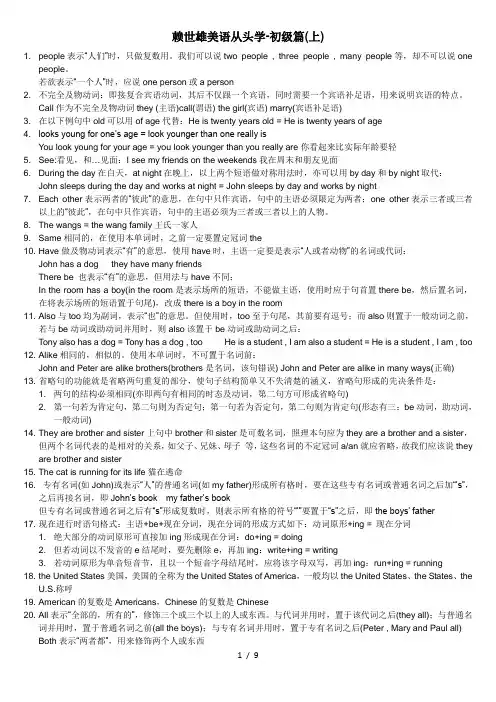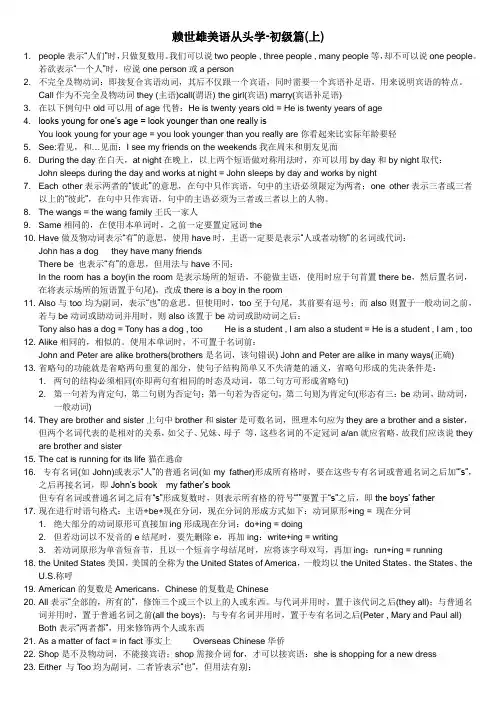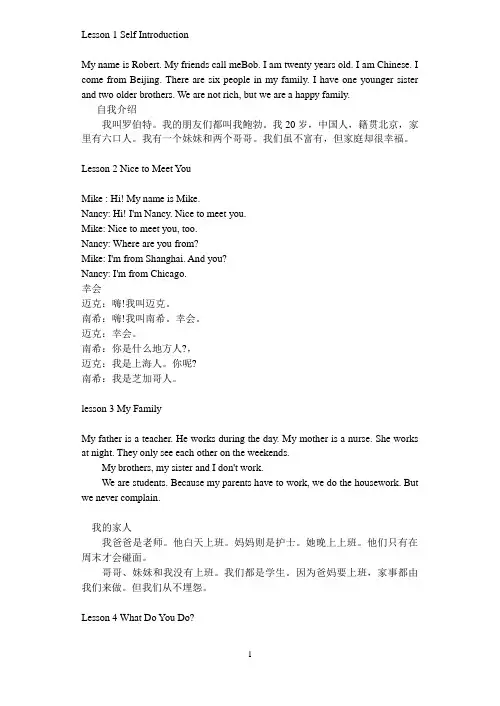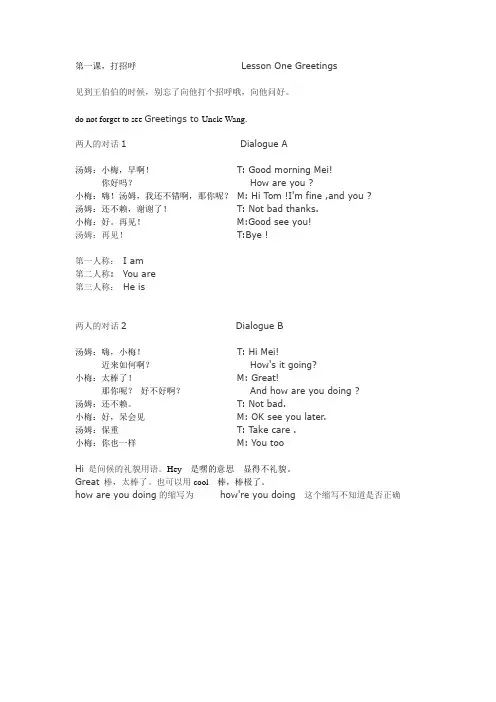赖世雄初级美语入门篇
赖世雄零起点英语1(入门篇)

读书笔记模板
01 思维导图
03 读书笔记 05 目录分析
目录
02 内容摘要 04 精彩摘录 06 作者介绍
思维导图
关键字分析思维导图
老师
爱好
入门篇
知识
零起点
时间
宾语
零起点
语法
英语 副词
疑问
赖世雄
活用
信
进行时
名词
动词
笔友
内容摘要
很多人想学好英语,却总是事与愿违,其实不是我们学不好,而是英语基础不够扎实。
贴身家教,不出国也能把英语学得棒棒的!
《赖世雄零起点英语》系列由赖世雄老师和吴纪维老师精心编写,
常青藤英语团队细心编辑加工,一共三册,以美语为主,共230课,依次分为入门篇、基础篇、进阶篇。零起点1
是零散的基础语法知识点的介绍,2和3慢慢介入课文的形式,通过文章语境的实例运用进一步巩固前附的语法知
识。是一套由浅入深、循序渐进、图文并茂、内容实用的英语教程,配合讲解音频,句句干货,让学习扎实又有
every day是时间副词,表示“每一天”,是两个词,可以置于句尾或句首;everyday是形容词,表示“每 天的”,是一个词,之后一定要加名词。
字尾如果是t或d时,若与后面的词没有连读,则该t或d要消音。如Paul and David中and的d要消音。
here表示“这里”;there表示“那里”。两者之前都可以接over,用来强调语气,表示“就在”。
Lesson 25 活用 特殊疑问句及一般
问句
Lesson 27 时刻 的说法1
Lesson 28 时刻的 说法2
Lesson 29 活用时 间名词
Lesson 30 介绍现 在进行时
赖世雄初级美语入门

赖世雄初级美语入门赖世雄初级美语入门篇》听课笔记,持续更新中~(原创)这是《赖世雄初级美语入门篇》听课笔记,需要的请下载~~~wql 2004-12-04 16:41我急需cmczbms2004-12-06 12:09Lesson 01greetingsADont forget to say greetings to uncle Wang.见到王伯伯的时候不要忘了向他问好。
I hope you have a good morning.Who are you 你是谁Where are you 你在哪儿,How are you 你好吗,回答用,Im fine.Im a boy. You area boy. He is a boy.This bed is bad. 这个床很坏。
注意 bed 和 bad 的发音区别。
I seeyou there. 我看见你在那里。
See you. Good bye. Bye. See you later.Bhi 和 hey的区别。
Hows it goingGreat. Wonderful. Cool.How are you doing Howre you doing How are you回答用 notbad。
take care保重。
take care of yourself.You tooHave a good time. 过你愉快。
Thanks. You too.谢谢,你也一样。
cmczbms 2004-12-06 12:12Lesson1Greetings打招呼DialogAA: Good morning May. How are youB: Hi Tom.I’m fine. And youA: Not bad. Thanks.B: Good. Se e you.A: Bye.BA: Hi May. How’s it goingB: Great. And how are you doingA: Not bad.B: Ok. See you later.A: Take care.B: You too.A甲:早啊,小梅。
赖世雄美语从头学初级篇上

赖世雄美语从头学-初级篇(上)1. people表示“人们”时,只做复数用。
我们可以说two people , three people , many people等,却不可以说onepeople。
若欲表示“一个人”时,应说one person或a person2. 不完全及物动词:即接复合宾语动词,其后不仅跟一个宾语,同时需要一个宾语补足语,用来说明宾语的特点。
Call作为不完全及物动词they (主语)call(谓语) the girl(宾语) marry(宾语补足语)3. 在以下例句中old可以用of age代替:He is twenty years old = He is twenty years of age4. looks young for one’s age = look younger than one really isYou look young for your age = you look younger than you really are你看起来比实际年龄要轻5. See:看见,和…见面:I see my friends on the weekends我在周末和朋友见面6. During the day在白天,at night在晚上,以上两个短语做对称用法时,亦可以用by day和by night取代:John sleeps during the day and works at night = John sleeps by day and works by night7. Each other表示两者的“彼此”的意思,在句中只作宾语,句中的主语必须限定为两者;one other表示三者或三者以上的“彼此”,在句中只作宾语,句中的主语必须为三者或三者以上的人物。
8. The wangs = the wang family王氏一家人9. Same相同的,在使用本单词时,之前一定要置定冠词the10. Have做及物动词表示“有”的意思,使用have时,主语一定要是表示“人或者动物”的名词或代词:John has a dog they have many friendsThere be 也表示“有”的意思,但用法与have不同:In the room has a boy(in the room是表示场所的短语,不能做主语,使用时应于句首置there be,然后置名词,在将表示场所的短语置于句尾),改成there is a boy in the room11. Also与too均为副词,表示“也”的意思。
(完整word版)赖世雄美语从头学-初级篇(上)

赖世雄美语从头学-初级篇(上)1. people表示“人们”时,只做复数用。
我们可以说two people , three people , many people等,却不可以说one people。
若欲表示“一个人”时,应说one person或a person2. 不完全及物动词:即接复合宾语动词,其后不仅跟一个宾语,同时需要一个宾语补足语,用来说明宾语的特点。
Call作为不完全及物动词they (主语)call(谓语) the girl(宾语) marry(宾语补足语)3. 在以下例句中old可以用of age代替:He is twenty years old = He is twenty years of age4. looks young for one’s age = look younger than one really isYou look young for your age = you look younger than you really are你看起来比实际年龄要轻5. See:看见,和…见面:I see my friends on the weekends我在周末和朋友见面6. During the day在白天,at night在晚上,以上两个短语做对称用法时,亦可以用by day和by night取代:John sleeps during the day and works at night = John sleeps by day and works by night7. Each other表示两者的“彼此”的意思,在句中只作宾语,句中的主语必须限定为两者;one other表示三者或三者以上的“彼此”,在句中只作宾语,句中的主语必须为三者或三者以上的人物。
8. The wangs = the wang family王氏一家人9. Same相同的,在使用本单词时,之前一定要置定冠词the10. Have做及物动词表示“有”的意思,使用have时,主语一定要是表示“人或者动物”的名词或代词:John has a dog they have many friendsThere be 也表示“有”的意思,但用法与have不同:In the room has a boy(in the room是表示场所的短语,不能做主语,使用时应于句首置there be,然后置名词,在将表示场所的短语置于句尾),改成there is a boy in the room11. Also与too均为副词,表示“也”的意思。
赖世雄初级美语(全)

Lesson 1 Self IntroductionMy name is Robert. My friends call meBob. I am twenty years old. I am Chinese. I come from Beijing. There are six people in my family. I have one younger sister and two older brothers. We are not rich, but we are a happy family.自我介绍我叫罗伯特。
我的朋友们都叫我鲍勃。
我20岁,中国人,籍贯北京,家里有六口人。
我有一个妹妹和两个哥哥。
我们虽不富有,但家庭却很幸福。
Lesson 2 Nice to Meet YouMike : Hi! My name is Mike.Nancy: Hi! I'm Nancy. Nice to meet you.Mike: Nice to meet you, too.Nancy: Where are you from?Mike: I'm from Shanghai. And you?Nancy: I'm from Chicago.幸会迈克:嗨!我叫迈克。
南希:嗨!我叫南希。
幸会。
迈克:幸会。
南希:你是什么地方人?,迈克:我是上海人。
你呢?南希:我是芝加哥人。
lesson 3 My FamilyMy father is a teacher. He works during the day. My mother is a nurse. She works at night. They only see each other on the weekends.My brothers, my sister and I don't work.We are students. Because my parents have to work, we do the housework. But we never complain.我的家人我爸爸是老师。
赖世雄初级美语入门篇 第一课,打招呼

第一课,打招呼Lesson One Greetings
见到王伯伯的时候,别忘了向他打个招呼哦,向他问好。
do not forget to see Greetings to Uncle Wang.
两人的对话1 Dialogue A
汤姆:小梅,早啊!T: Good morning Mei!
你好吗?How are you ?
小梅:嗨!汤姆,我还不错啊,那你呢?M: Hi Tom !I'm fine ,and you ?
汤姆:还不赖,谢谢了!T: Not bad thanks.
小梅:好。
再见!M:Good see you!
汤姆:再见!T:Bye !
第一人称:I am
第二人称: You are
第三人称:He is
两人的对话2 Dialogue B
汤姆:嗨,小梅!T: Hi Mei!
近来如何啊?How's it going?
小梅:太棒了!M: Great!
那你呢?好不好啊?And how are you doing ?
汤姆:还不赖。
T: Not bad.
小梅:好,呆会见M: OK see you later.
汤姆:保重T: Take care .
小梅:你也一样M: You too
Hi 是问候的礼貌用语。
Hey 是嘿的意思显得不礼貌。
Great 棒,太棒了。
也可以用cool 棒,棒极了。
how are you doing的缩写为how're you doing 这个缩写不知道是否正确。
《赖世雄初级美语》word版(全-经典)
Lesson 1 Self IntroductionMy name is Robert. My friends call me Bob. I am twenty years old. I am Chinese.I come from Beijing. There are six people in my family. I have one younger sister and two older brothers. We are not rich, but we are a happy family.自我介绍我叫罗伯特。
我的朋友们都叫我鲍勃。
我20岁,中国人,籍贯北京,家里有六口人。
我有一个妹妹和两个哥哥。
我们虽不富有,但家庭却很幸福。
Lesson 2 Nice to Meet YouMike : Hi! My name is Mike.Nancy: Hi! I'm Nancy. Nice to meet you. Mike: Nice to meet you, too.Nancy: Where are you from?Mike: I'm from Shanghai. And you? Nancy: I'm from Chicago. 幸会迈克:嗨!我叫迈克。
南希:嗨!我叫南希。
幸会。
迈克:幸会。
南希:你是什么地方人?,迈克:我是上海人。
你呢? 南希:我是芝加哥人。
Lesson 3 My FamilyMy father is a teacher. He works during the day. My mother is a nurse. She works at night. They only see each other on the week- ends. My brothers, my sister and I don't work. We are students. Because my parents have to work, we do the housework. But we never complain.我的家人我爸爸是老师。
赖世雄美语从头学-入门篇
赖世雄美语从头学-入门篇1. How are you=How are you doing=How are you getting along?你好吗?Great, thanks! Fine, thanks! Not bad, thanks! So-so, thanks!What’s up? / What’s happening?近况如何?Nothing / same as usual 没什么/老样子2. A: see you later B: take care(保重) A: you too3. “Excuse me”或”I’m sorry”之后除可置句点以外,亦可置逗点,再置连接词but,以连接另一个句子。
but原意为”但是”,但此处不必译出:Excuse me, but where is the station? I’m sorry , but I’m new here4. A:Thank you for your help B:You’re welcome/Don’t mention it/Not at all/No problem5. Where are you from / Where do you come from / what’s your nationality前面两个可用于询问对方的省籍或国籍,但最后一句则仅限于国籍6. May I have your name, please?=What’s your name?上列两句均是向对方请教姓名的问句。
虽然意思相同,但显然第一个问句语气较客气有礼,多在正式的场合中使用。
第二个问句则为长辈对晚辈或上次对下属使用。
7. How old are you?=What’s your age?以上都是询问对方年龄的问句。
咱们中国人彼此见面可以询问对方年龄,但与西方人交往时,除非对方主动透露自己的年龄,否则我们随意询问别人的年龄会被视为不礼貌的行为。
赖世雄美语从头学初级篇Lesson 1课文及讲解
Call当不完全及物动词; 年龄、籍贯的说法; there is /are初步(以后课程有更详细介绍)=======================Title==============================Lesson 1 Self introduction======================Article==============================My name is Robert. My friends call me Bob. I am twenty years old. I am Chinese. Icome from Beijing. There are six people in my family. I have one younger sister and two older brothers. We are not rich, but we are a happy family.======================Words==============================Name. What’s your name, please?Friend. He has many friends.Call. Cindy calls her doll Baby.Come. Come from…I come from Japan.People. (people只表示复数,单数用person)There are many people at the station.There is only one people in the room. 错There is only one person in the room.Family. He has a large family.Rich. The old man is rich, but he is not happy. In fact, he is very happy.Happy. I feel happy when I am with you.=====================Grammar==============================简单说明下,动词简单分两类(及物不及物)及物意思是动词后要表宾语, 而及物下又分完全及物,和不完全不及物I love you. 及物后跟宾语就完成句子了I call you Bob. 不完全及物,跟了宾语还不完全,所以加宾语补足语不及物He fainted. 他晕倒了. 跟上动词就完事了不能加宾语叫完全不及物He is a gentleman. (这里我并不是太懂怎么解释)不完全及物动词是动词后跟宾语意思还不完整My friends call me Bob. 这里call me后要跟Bob.They call the little girl…这里并没有结束后面必须加宾语补足语They call the little girl Mary.I am twenty years old.句子结构为人+be动词+数字+year(s) +old/of age.I am twenty years old.The baby is one year old.He is forty years of age.Age.看起来比实际年轻的用法Look young of one’s age. == Look younger than one really is.You look young of your age. You look younger than you are.He look young of his age. He younger than he really is.I am Chinese. = I am a Chinese.当形容词用不用加a,当名词用要加aThere are six people in my family.这里there are表示有(后面是复数) there同时也是副词”那里”的意思,但后面跟be动词is/are时表示有,以后会说到have这个有的区别Put the book there. 把书放在那里=======================讲解==============================Lesson one self introductionThe lesson is very good. 这一课相当不错Lesson one/two 第一/二课Part one第一部分reading 阅读My name is Robert.My 我的my bicycle我的自行车my home我家Name 名字What's your name, please? 请问你叫什么名字.=what is your name, please?My name is Peter. My name is Robert.please,请,但英美一般放句尾,please前通常放逗号Open the door, please.My friends call me Bob.Friend +s是朋友的复数,2个及以上call除了称某人为...还有打电话的意思Call me, please. 请打电话给我Call me when you have time. 有空给我电话Give me a call when you have time.在这句,call为名词(如果暂时不理解不是很重要)I am twenty years old.I am * year(s) old 我是多少岁,当一岁就用year没有复数,但你一岁也说不出这句. He is one year old.I am twenty years. (那就是我20年,没人理解是什么意思)old不能省,但也可以改用of age.I am twenty years of age.也可以直接I am twenty.How old are you? 你多大年龄,按中文说法就是: you are how old. 英语中疑问词需要放在句首(以后会具体讲)在英美环境,一般男的不能随便问女人年龄I am Chinese.I am a Chinese.这样也行,但不加也可以,一个是名词,一个是形容词(如果暂时不理解没关系) 单数名词要加冠词This is a book. He is a Chinese. Chinese同时也可作形容词. I amChinese.He is an American. 名词He is American.形容词I come from Beijing.come来, from从什么地方I come from Guangdong. He comes from Sichuan.I am from Beijing.也可以Where are you from? 你是哪里人,中文直接翻译是you are from where?但英文疑问词放句首(第二次讲了)Where do you come from? 你是哪里人,这里面有个do先讲一下,以后还会具体讲. come是一般动词,一般动词没办法与主语倒装,be动词才可以your name is what?-- What is your name? come不能直接写成: where come you from? 所以就加助动词do, where do you come from? 如果是be动词的, where are you from?这样可以There are six people in my family.在英文中have ,has是有的意思,但只有那些有生命的东西才能用这个有. In my family has six people.这样是错的,因为家庭不是指某个具体有生命的动物不能用have ,has,另外,in my family,这个由in引导的介词短语不能作主语(暂时记也可以),如果遇到这种介词短语的,那就用there is/are作主语,there are后面跟复数名词桌上有本书,中文本能on the desk has a book.由上可知这是错的,只能改用there is, there are.但这里是单数一本书,就用there is a book one thedesk.房间里有一只猫. There is a cat in the room.There are six people in my family.同理一个人用person.两个人或以上就用peopleOne person,一个人,两个人就用two peopleI have one younger sister and two older brothers.这里有have了,一般用have主语就是有生命的动物I have a book. He has a book. (第三人单数称用has)Younger sister表示妹妹,如果不加就是表示姐妹,可能是姐姐也可能是妹妹,older大的就是哥哥Younger sister, younger brother妹妹,弟弟Older brother哥哥,older sister姐姐We are not rich, but we are a happy family.but是连词,但是的意思rich富有的He is rich.他很有钱He is rich, but he is not happy.他有钱但不快乐.(骗人的,有钱的人都很快乐)======================Practice==============================What's your name?My name is Peter Wang. == I'm peter Wang.How old are you?I'm eighteen years old. == I'm eighteen years of age.Where are you from?I am from Shanxi. == I come from Shanxi.How many people are there in your family? There are five people in my family. == Five.。
(完整word版)赖世雄美语从头学初级篇Lesson32学习笔记
Any ,some的使用与区别Much, many分别用于修饰不可数名词,和可数名词===================================================================== Leeson 32 coins for the Phone===============================Article==================================== Hi, Connie! Do you have any change?What for?I want some coins for the pay phone.I see. Here you are.Thank you.You're welcome.===============================Words==================================== Change n.零钱(不可数)不可数指这个单词不可数,例中文,你有多少零钱,而不是你有几个零钱(many 修饰可数名词,much修饰不可数名词)How many changes do you have?错How much change do you have?对Any , some的用法Do you have any change?I want some coins for the pay phone.Any 与some均可作数量形容词,之后放可数不可数名词都行,但用法有区别:Any 用于疑问句或否定句中Do you have any money?I don't have any friends.Some 用于肯定句中Do you need any help?He doesn't need any help.He needs some help.What for?为什么=why?I see 我明白了. = I understand.Bill is studying for his test.Oh, I see.Here you are. 拿去吧Please pass me the salt.Here you are.==============================Grammar===================================================================讲解===================================== Lesson thirty-two coins for the phoneHello, this is Peter again. Very happy to be on the air. Now let's open this book onpage one hundred forty. Page one hundred forty we are now on this page and wecan see this lesson " Lesson thirty-two." Now we can also see the title "Coins for thephone".The phone就是指the telephone老师在说这tele是和电有关的.这是说错了,tele是和远有关的前缀telescope就是望远镜.. 但老师的水平非常非常高,只是这一个小小错,其实前面也有一个什么单词拼错了忘了.这都是小问题.只有好好认真跟着老师把这初中高级学完,英语水平能达到扎实的大学生水平.这里指的扎实是比一般的普通大学生(英语专业除外)好很多的谦虚说法.He likes to watch TV. He watches TV every night.他喜欢看电视,他每天晚上看电视.电视的单词是television . 电话: telephone. 与电话有关的介词用onI want to talk to him on the phone (telephone).我想和他电话里聊天.不要用In,如果用in就是自己跑到电话里面了.I enjoy to talk to him on the phone. I like to talk to him on the phone.我喜欢和他聊电话.We have short dialog.Hi, Connie! Do you have any change?Hey, what doing over there? 嘿,你在那干嘛?hi,是打招呼. hey是唤起别人的注意.Change 可以作变化讲. 在这里是零钱He hasn't changed very much. 他改变的不多.He hasn't changed a lot. He is still very handsome.他变化不大,还是这么帅.(可能是大家都老了,他没老多少)Change 作零钱用,不可数How many changes do you have? 错,这是不可数名词,要用much.而且不能加smoney也是不可数.How much money do you have? 你有多少钱.Well, I don't have much money. I have two dollars only.我没多少钱,我只有2块钱.How much change do you have? 你有多少零钱啊?I have two dollars in change. 我有2块零钱. 介词用in 放句尾Keep the change. 零钱免找.What for?这里其实就等于why?Why do you ask the question like that?Why do you me ask such a question?What for? 为了什么?Why do you learn/study English?你为什么学英语?What do you learn English for? 这样也可以.这里也可以写成: for what do you learn English? 但尽量把what置前I want some coins for the pay phone.coin是可数名词(硬币)I have five coins with me. 我身上有5块钱硬币.How much money do you have with you?I have ten dollars with me.你身上有多少钱啊? (这里with you可以省略)我身上有10块钱.I see. Here you are.see在这里后面没有宾语,就当我知道了解释.当不及物动词时,通常主语都是I. 所以都是说I see.I see = I understand.我们为什么要学英文啊?Why do we have to learn English?Well, English is a universal language. Whenever you go, you'll use it. If you can speak English. You’ll have no problems communicate withpeople. /kəˈmjuːnɪkeɪt/交流英语是个环球语言,无论你去哪都能用. 如果你能说英语, 你和人交流就没问题.Oh, I see. 哦,我知道了.(我一句也没听懂)如果see 后有宾语,那就是表示看到的意思I see it. 我看到它了.I see Peter every day. 我天天都见到皮特.Here you are. be动词后有地方副词时或是由介词形成的地方副词短语,be动词翻译成"在"I am at the station. 我在车站. I am here.我在这里但here you are.不是这里你在的意思. 是固定用法:给你,拿去吧把东西给别人时,说这句: here you are.在店里看到表不错,想看下:That watch is beautiful. Can I take a look at it?那手表很漂亮,能给我看下吗?No problem.没问题here you are. 拿去吧.(然后你接到手时,手滑掉地上了)Thank you.Roy is polite. 他有礼貌.He is polite. He studies very hard. He is a good student and he is polite.说这么多话我就一句翻译: 他很五道杠学生.You're welcome.You're = you are的缩写.不客气的意思. 实际会话中用: you bet. bet是打赌的意思,这里是不客气正式用法: don't mention it. 别提了. 别挂心上.Thank you very much for your help. 非常谢谢你的帮忙.人家回: you're welcome. / You bet. / don't mention it.别客气. (你这么客气我都不好意思收钱了)===============================Practice=================================== He doesn't have ____ friends.Some, any, no, none.这里none是代词,相当于名词,名词后不再放名词Do you have any friends? I am sorry, but I have none.你有朋友吗? 对不起,我没朋友.(我帅到没朋友)(其实这句问得很有问题,如果你平时问是你有多少朋友,而不是你有朋友吗,而且这个any明显暗示你这人很可能没有朋友. 应该问how many friends do you have? 这样说话才礼貌.当然只是深纠下)No 与Not冲突. 如果把no加里面可以翻译为: 他没有没有朋友.可以写成: he has no friend(s).Any经常与not并用,所以选这个. some用在肯定句中.He has some friends.____ can sing.None my friends. None of my friends.None of friends. No of friends.这里又是none是代词,后面不能再放名词my friend.最后一个no, no本身是形容词,后面应该放名词,这of是介词,所以不成立.(其实在学习中我们这样分析,但在说话中没时间分析.需要多读句子,多背课文,这样到时候就会脱口而出,不会分析名词形容词副词什么的.)____ does he have?How many change. How many changes.How much change. How much changes.这里知道change是不可数,所以后面加e的直接去掉两个剩下的: many用来修饰可数名词,所以知道是哪个了.I don't have ____ with me.Some moneys. Any moneys. Some money. Any money.这个也好分析,首先some用在肯定句中.所以去掉两个some第二,money也不可数,所以结果明了我身上有10块钱: I have ten dollars with me.I have ten dollars, but I leave the money at home.我有10块钱,但我把它放家了(这人身价好高).I have some money with me.我身上有点钱.I don't have any money with me. = I have no money with me.I have ____ questions.Some, any, none, no any.这里是肯定句,所以用some.any用否定或疑问(也有用肯定表强调的)I don't have any questions.none是代词表示名词,后面question是名词所以不成立.No any我不会分析,抱歉,但是不对.================================others===================================。
